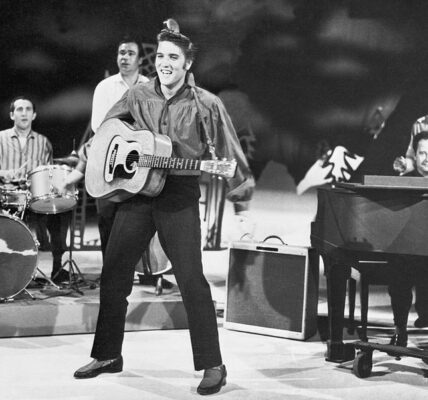“He’ll Have to Go”: Elvis Presley’s Timeless Soulful Ballad, Continuing to Make an Impact Decades Later
“He’ll Have to Go” by Elvis Presley is a poignant and evocative ballad that showcases the King’s remarkable ability to convey deep emotion through his powerful voice. Originally a hit for Jim Reeves in 1959, Elvis recorded his version in the early 1970s, adding his unique touch to the classic country tune. This song, with its rich narrative and soulful delivery, stands as a testament to Elvis’s versatility and enduring appeal.

The song tells the story of a man who, heartbroken and desperate, calls his lover to express his feelings and ask her to choose between him and another man. The lyrics are direct and heartfelt, encapsulating the pain and longing of a love triangle. The chorus, with lines like “Put your sweet lips a little closer to the phone, let’s pretend that we’re together all alone,” is particularly poignant, reflecting the protagonist’s yearning for a connection that seems just out of reach.
Elvis’s rendition of “He’ll Have to Go” is distinguished by his emotive vocal performance. His voice, rich and resonant, perfectly captures the song’s melancholic tone. He infuses the lyrics with a sense of urgency and vulnerability, making the listener feel the depth of the protagonist’s despair. This emotional depth is a hallmark of Elvis’s ballads, and “He’ll Have to Go” is no exception.

The musical arrangement in Elvis’s version is also noteworthy. It features a gentle, yet steady, rhythm section that underpins the sorrowful narrative. The arrangement allows Elvis’s voice to take center stage, supported by subtle instrumentation that enhances the song’s emotional impact. The use of strings and background vocals adds a layer of depth and richness to the track, creating a lush soundscape that envelops the listener.
“He’ll Have to Go” was part of Elvis’s live performances, where he often brought a new dimension to the song with his charismatic stage presence. These performances were a reminder of Elvis’s ability to connect with his audience on an emotional level, making each rendition of the song feel personal and intimate.

Despite being a cover, Elvis’s version of “He’ll Have to Go” stands on its own as a powerful interpretation of the classic hit. It highlights his talent for taking existing songs and transforming them with his unique style and emotional intensity. This track is a fine example of why Elvis Presley remains a beloved and influential figure in music history. His ability to infuse every song with his distinctive touch ensures that even today, decades after its release, “He’ll Have to Go” continues to resonate with listeners.
Elvis Aaron Presley, often referred to as the “King of Rock and Roll,” was born on January 8, 1935, in Tupelo, Mississippi, USA. He rose to prominence in the mid-1950s, becoming one of the most iconic and influential figures in the history of popular music. Presley’s musical journey began at an early age when he started singing in church and listening to various genres of music, including gospel, blues, and country. In 1954, he signed a recording contract with Sun Records, where he began his career blending elements of rockabilly, rhythm and blues, and country music. His breakthrough came with the release of his first single, “That’s All Right,” followed by a string of hits such as “Heartbreak Hotel,” “Hound Dog,” and “Jailhouse Rock.” With his charismatic stage presence, distinctive voice, and provocative dance moves, Presley captured the hearts of audiences worldwide, revolutionizing the music industry and popular culture. Presley’s impact extended beyond music; he also found success as an actor, starring in a series of films throughout the 1960s. Despite his commercial success, he faced criticism from some quarters for his crossover into mainstream entertainment and the perceived dilution of his musical authenticity. Throughout his career, Presley struggled with the pressures of fame, leading to personal challenges, including substance abuse and health issues. Despite these obstacles, he remained a beloved figure, revered for his contributions to music and his enduring legacy. Tragically, Elvis Presley passed away on August 16, 1977, at the age of 42, leaving behind a legacy that continues to resonate with generations of fans. He was posthumously inducted into the Rock and Roll Hall of Fame, and his music remains a timeless testament to his enduring talent and cultural impact.


